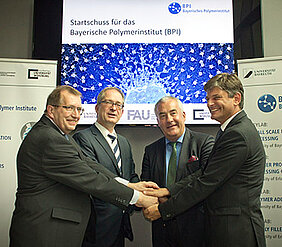Bavarian Polymer Institute launched
07/26/2016Novel materials essential for key technologies in the fields of energy, communication, climate change and health: these are the focal areas of research at the Bavarian Polymer Institute. The partner universities have now signed a cooperation agreement.

Whether fighting climate change, tapping new sources of energy, developing applications in the health sector or the broad field of communication: Polymer materials are ubiquitous in virtually all innovative products. Developing novel multifunctional polymers and polymer light-weight materials is crucial to tackle the technological challenges of the 21st century.
A nationally leading research institute
Researchers in Bavaria are now working towards this goal at the newly founded Bavarian Polymer Institute (BPI). The institute is a joint venture of the universities of Bayreuth, Erlangen-Nuremberg and Würzburg. The university presidents have recently signed the cooperation agreement in the presence of Dr. Ludwig Spaenle, Minister of State, as a representative of the Free State of Bavaria. Their goal is to establish a nationally leading research institute of international standing to conduct fundamental research in polymer sciences and polymer technology.
A priority will be the creation of a harmonised research infrastructure in the form of the so-called key laboratories (KeyLabs). Ten such KeyLabs in total are set to work under the roof of the BPI. The state of Bavaria will finance them with EUR 15 million over the next two years. The University of Würzburg accommodates two of these labs. Covering rather young fields of research in the BPI, they nevertheless hold great innovation potential. At the University of Würzburg, they are situated at the Departments of Chemistry and Medicine.
The Würzburg “Supramolecular Polymers” KeyLab
The Supramolecular Polymers KeyLab headed by Professor Frank Würthner is concerned with a wholly new class of polymers formed not by classical polymerisation reactions, but by the dynamic arrangement of low-molecular blocks. This gives access to higher-order materials with enhanced properties as are required for liquid crystal displays or functional materials for organic electronics.
Frank Würthner is the Chair of the Department of Organic Chemistry II at the University of Würzburg. In a couple of weeks, the newly built Center for Nanosystems Chemistry on the campus will be ready for him to move in. The new research building will also accommodate the Supramolecular Polymers KeyLab.
The Würzburg KeyLab “Polymers for Medicine”
The Polymers for Medicine KeyLab is led by Professor Jürgen Groll, Chair of the Department for Functional Materials in Medicine and Dentistry. The laboratory combines polymer research and technology with a medical environment while involving the Fraunhofer Translational Center for Regenerative Therapies for Oncology and Musculoskeletal Diseases in Würzburg.
This approach allows the problem-oriented development of polymer biomaterials and provides the suitable environment to transfer research results quickly into clinical practice. Key topics include the biocompatibilisation and bioactivation of implant surfaces and the development of polymers to function e.g. as carrier structures for cells or to transport active ingredients.
Groll and his colleagues are pioneers in the field of biofabrication which has been actively pursued in Würzburg since 2010. This branch of research involves cells and materials processed to tissue-like composite structures using automated 3D printing technologies.
Intensive collaboration in research and teaching
Under the umbrella of the BPI, the universities in Bayreuth, Erlangen-Nuremberg and Würzburg are seeking to pool and network their skills and expertise in Polymer Science and Engineering in an institutional context. Their goal is to work jointly towards establishing the chain of expertise necessary to conduct seminal research projects and promote cutting-edge research in this highly interdisciplinary field. Moreover, the universities plan to intensify their collaboration in research and teaching to harness existing expertise and resources more effectively for their research activities and to improve the offering for researchers, scientific talent and students.
A defining moment for the scientific landscape
As the cooperation agreement was signed on Monday, 26 July in Bayreuth, Minister of State Ludwig Spaenle said that this was a defining moment for the scientific landscape in North Bavaria. He commended the joint venture of the three universities as being an example of successful team work in the Bavarian science landscape. “The Bavarian Polymer Institute will pool the different expertise in technical polymer research of the three universities. This presents a great opportunity for us to establish the institute as a nationally leading research institution in Bavaria," Spaenle further.
Alfred Forchel, president of the University of Würzburg, focused on the cooperation with the industry in his opening address. "Our participation in the Bavarian Polymer Institute will allow us to significantly expand the application-relevant key domain of material sciences which is crucial for Lower Franconia," Forchel explains. At the same time, the research activities in Würzburg perfectly complement the work going on in Bayreuth and Erlangen-Nuremberg. He believes that the partnership will set the course for the successful development of the BPI and will further strengthen North Bavaria as a scientific and industrial site.
Contact
Prof. Dr. Jürgen Groll, Phone: +49 931 201 73610, fmz-office@uni-wuerzburg.de
Prof. Dr. Frank Würthner, Phone: +49 931 31-85340, wuerthner@chemie.uni-wuerzburg.de






